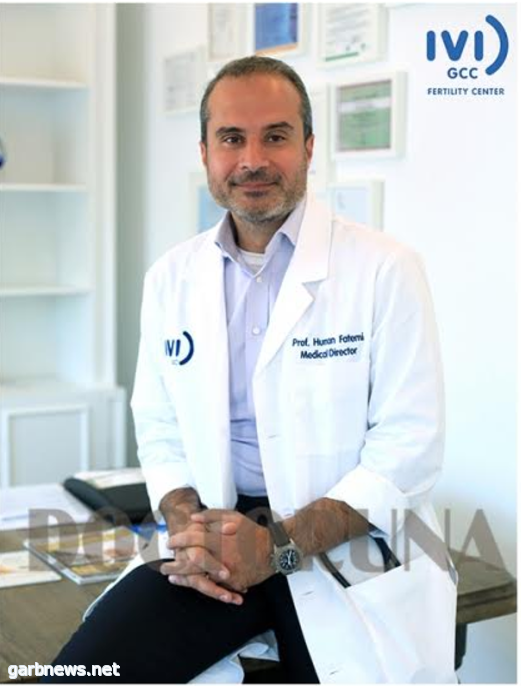

المصدر -
Children inherit four times as many new mutations from their fathers than their mothers
Abu Dhabi, UAE, 28 March 2018: Women have always been warned that the older they are, the greater the risk of health problems for them and their babies - but a new study indicates that older fathers can also affect the baby's health.
The study explores how children inherit four times as many new mutations from their fathers than their mothers. The research explains that faults in the man’s DNA are a key driver for rare childhood diseases such as autism and schizophrenia. These figures mean that a child born to 30-year-old parents would, on average, inherit 11 new mutations from the mother, but 45 from the father.
Research suggests that a father aged 20 passes, on average, approximately 25 mutations, while a 40-year-old father passes on about 65. The study also shows that for every year a man delays fatherhood, he risks passing two more mutations on to his child.
“Women are born with all the eggs they’ll ever need. However, with men it is different. As majority of men don’t really undergo menopause, they produce sperms throughout their life. However, after they hit 40, some of these sperms start to misfire, which may lead to complications for babies to be born. This could be due to several factors like exposure to radiation, environmental toxins and plain old aging. These factors not only produce defective sperms, but could also lead to genetic disorders for the babies to be conceived,” said Prof. Dr. Human Fatemi, Subspecialist Reproductive Medicine & Reproductive Surgery, Medical Director, IVI Middle East Fertility Clinic.
At IVI Fertility, the focus is not just on achieving a pregnancy – it is on achieving a healthy pregnancy that eliminates any possibilities of an unhealthy baby. Tests like the Preimplantation Genetic Screening (PGS) are highly recommended and widely practiced since it screens for abnormalities in the number of chromosomes in the embryos, obtained by In-Vitro-Fertilisation (IVF) or Intra-cytoplasmatic-sperm-injection (ICSI) prior to the transfer of the embryos into the uterus of the woman.
It is important to know that normally an embryo has 46 chromosomes, 22 in pairs and additional, the sex chromosomes, XX in female and XY in male. An embryo that does not have the correct number of chromosomes is called aneuploid. Changes in the numbers of the chromosomes can lead to no pregnancy at all, miscarriages, still births or disabled children which can be avoided by an advanced by simple test like the PGS. Infact, couples with advanced age, previously known genetic disorders, recurrent miscarriages and failed IVF cycles are definitely tested with PGS to ensure a high healthy pregnancy rate.
While older fathers are likely to pass on the risk of genetic mutations to their babies, several other studies show that women with partners aged 40 and older were 27% more likely to experience a miscarriage than those with partners aged
25 or younger. This also boosts the chances of complications, since women’s eggs decline in number and quality over time. It has also been noted that cancer rates among offspring seem to rise too as their dads grow older, possibly because of some of the same DNA mutations that contribute to other conditions.
At IVI Fertility, we offer our patients the facility to eliminate genetic mutations through our advanced medical approach. Our advanced technologies and customized treatments ensure that each case is diagnosed efficiently, which has been the backbone of our success today,” added Dr Barbara Lawrenz, Consultant IVF and IVI Fertility Abu Dhabi.
IVI Middle East Fertility Clinics are a part of the world leading IVF institution – IVI and offer the highest standards of care. IVI Fertility has the highest success record of 160,000 births worldwide and is widely respected for not just the science but also for research and advancements in the field of Reproductive Medicine. The clinics have already celebrated many successful pregnancies and delivered the highest success rate of over 72%. There are 71 IVI Fertility Clinics all over the world including Abu Dhabi, Dubai and Muscat that are helping millions of couples achieve their dream of parenthood.
Abu Dhabi, UAE, 28 March 2018: Women have always been warned that the older they are, the greater the risk of health problems for them and their babies - but a new study indicates that older fathers can also affect the baby's health.
The study explores how children inherit four times as many new mutations from their fathers than their mothers. The research explains that faults in the man’s DNA are a key driver for rare childhood diseases such as autism and schizophrenia. These figures mean that a child born to 30-year-old parents would, on average, inherit 11 new mutations from the mother, but 45 from the father.
Research suggests that a father aged 20 passes, on average, approximately 25 mutations, while a 40-year-old father passes on about 65. The study also shows that for every year a man delays fatherhood, he risks passing two more mutations on to his child.
“Women are born with all the eggs they’ll ever need. However, with men it is different. As majority of men don’t really undergo menopause, they produce sperms throughout their life. However, after they hit 40, some of these sperms start to misfire, which may lead to complications for babies to be born. This could be due to several factors like exposure to radiation, environmental toxins and plain old aging. These factors not only produce defective sperms, but could also lead to genetic disorders for the babies to be conceived,” said Prof. Dr. Human Fatemi, Subspecialist Reproductive Medicine & Reproductive Surgery, Medical Director, IVI Middle East Fertility Clinic.
At IVI Fertility, the focus is not just on achieving a pregnancy – it is on achieving a healthy pregnancy that eliminates any possibilities of an unhealthy baby. Tests like the Preimplantation Genetic Screening (PGS) are highly recommended and widely practiced since it screens for abnormalities in the number of chromosomes in the embryos, obtained by In-Vitro-Fertilisation (IVF) or Intra-cytoplasmatic-sperm-injection (ICSI) prior to the transfer of the embryos into the uterus of the woman.
It is important to know that normally an embryo has 46 chromosomes, 22 in pairs and additional, the sex chromosomes, XX in female and XY in male. An embryo that does not have the correct number of chromosomes is called aneuploid. Changes in the numbers of the chromosomes can lead to no pregnancy at all, miscarriages, still births or disabled children which can be avoided by an advanced by simple test like the PGS. Infact, couples with advanced age, previously known genetic disorders, recurrent miscarriages and failed IVF cycles are definitely tested with PGS to ensure a high healthy pregnancy rate.
While older fathers are likely to pass on the risk of genetic mutations to their babies, several other studies show that women with partners aged 40 and older were 27% more likely to experience a miscarriage than those with partners aged
25 or younger. This also boosts the chances of complications, since women’s eggs decline in number and quality over time. It has also been noted that cancer rates among offspring seem to rise too as their dads grow older, possibly because of some of the same DNA mutations that contribute to other conditions.
At IVI Fertility, we offer our patients the facility to eliminate genetic mutations through our advanced medical approach. Our advanced technologies and customized treatments ensure that each case is diagnosed efficiently, which has been the backbone of our success today,” added Dr Barbara Lawrenz, Consultant IVF and IVI Fertility Abu Dhabi.
IVI Middle East Fertility Clinics are a part of the world leading IVF institution – IVI and offer the highest standards of care. IVI Fertility has the highest success record of 160,000 births worldwide and is widely respected for not just the science but also for research and advancements in the field of Reproductive Medicine. The clinics have already celebrated many successful pregnancies and delivered the highest success rate of over 72%. There are 71 IVI Fertility Clinics all over the world including Abu Dhabi, Dubai and Muscat that are helping millions of couples achieve their dream of parenthood.










